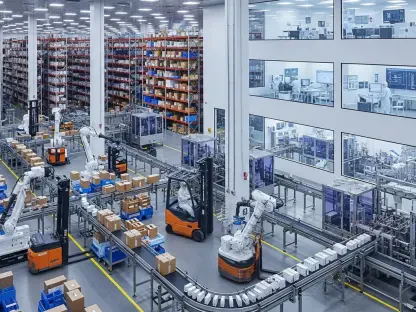In a rapidly evolving global market where operational agility can make or break a company, Nestlé, a titan in the food and beverage sector, has taken a bold step toward technological transformation by overhauling its enterprise resource planning (ERP) system with a focus on enhancing efficiency. This strategic upgrade to a cloud-based SAP S/4HANA platform integrates cutting-edge artificial intelligence (AI) and automation capabilities, aiming to streamline processes across its vast international network. The initiative is not just a technical refresh but a fundamental shift designed to enhance decision-making speed and operational efficiency. As businesses worldwide grapple with the need to adapt to dynamic consumer demands and complex supply chains, Nestlé’s move underscores a growing reliance on digital tools to maintain a competitive edge. This ambitious project promises to redefine how the company manages everything from procurement to product rollouts, setting a benchmark for industry peers navigating similar challenges in a tech-driven era.
Driving Digital Transformation with SAP S/4HANA
Nestlé’s transition to the SAP S/4HANA platform marks a significant milestone in its digital journey, with the first phase already rolled out across 112 countries and impacting 50,000 employees. This cloud-based system, equipped with an AI-powered assistant, is engineered to optimize critical functions like supply chain management and order fulfillment by harnessing real-time data. The ability to align supply with demand more effectively ensures that both in-store and online retailers benefit from smoother operations. Beyond immediate operational gains, the upgrade fosters consistency in reporting and planning, which is vital for a company of Nestlé’s scale operating in diverse markets. The enhanced flexibility offered by this system is expected to accelerate global product launches, enabling the company to respond swiftly to consumer needs and market trends. This initial deployment sets the stage for a broader implementation over the next two years, highlighting a commitment to long-term technological advancement.
The momentum behind this ERP upgrade reflects a broader industry shift toward modern IT infrastructure, especially as legacy systems face obsolescence with mainstream support for older SAP frameworks ending by 2027. Nestlé’s proactive approach, building on earlier migrations to cloud solutions, positions it as a leader in adopting scalable, innovative tools. The integration of AI into core business systems is poised to automate procurement practices and standardize processes, reducing inefficiencies that have historically plagued large corporations. Comments from company leadership emphasize that these technological strides are not merely about keeping pace but about redefining how global operations can be managed with precision. This transformation is a clear signal that embracing digital solutions is no longer optional but essential for maintaining relevance in a fast-paced, competitive landscape. As Nestlé continues to refine its operations through this platform, the ripple effects could inspire similar moves across the sector.
Balancing Efficiency Gains with Workforce Challenges
While the technological overhaul brings undeniable benefits, it coincides with broader cost-cutting measures that add a layer of complexity to Nestlé’s strategy. The company has announced plans to reduce its global workforce by approximately 16,000 jobs—about 6% of its total staff—over the coming two years, with cuts targeting both corporate roles and positions in manufacturing and supply chains. This restructuring, though not explicitly linked to the ERP upgrade, suggests a parallel effort to streamline operations through both automation and human resource adjustments. The juxtaposition of investing in advanced systems while scaling back on personnel raises questions about the balance between technological progress and its impact on employees. For a company operating on a global scale, managing this transition sensitively is critical to maintaining morale and public perception during a period of significant change.
Delving deeper into this dual approach, the potential for AI and automation to replace certain manual tasks cannot be ignored as a factor in workforce planning. The enhanced ERP system is designed to improve responsiveness and cut operational costs, which aligns with the overarching goal of efficiency. However, the human element of such transformations remains a pressing concern, as job reductions could affect communities and economies tied to Nestlé’s operations. Industry observers note that this tension between innovation and employment is a recurring theme for multinational firms adopting digital solutions. As the company progresses with its SAP S/4HANA rollout, it will need to navigate these challenges thoughtfully, ensuring that the pursuit of efficiency does not overshadow the value of its workforce. This delicate balancing act will likely shape how stakeholders view the long-term success of Nestlé’s digital and operational strategies.
Looking Ahead to Sustained Innovation
Reflecting on the strides made, Nestlé’s commitment to embedding AI and automation through the SAP S/4HANA platform stands as a transformative endeavor that reshapes its operational landscape across numerous countries. The early success of this initiative demonstrates a clear path toward faster decision-making and streamlined processes that benefit global markets. Yet, the simultaneous focus on workforce restructuring highlights the intricate challenges of aligning technological progress with human considerations, a dynamic that demands careful oversight.
Moving forward, the focus should shift to leveraging these digital tools to not only maintain efficiency gains but also explore new growth avenues, such as personalized consumer offerings driven by AI insights. Establishing robust support systems for affected employees through retraining programs could mitigate the impact of job cuts while fostering goodwill. Additionally, continuous investment in technology upgrades will be essential to stay ahead of industry shifts. Nestlé’s journey offers a blueprint for others, proving that innovation, when paired with strategic foresight, can redefine global business success.









